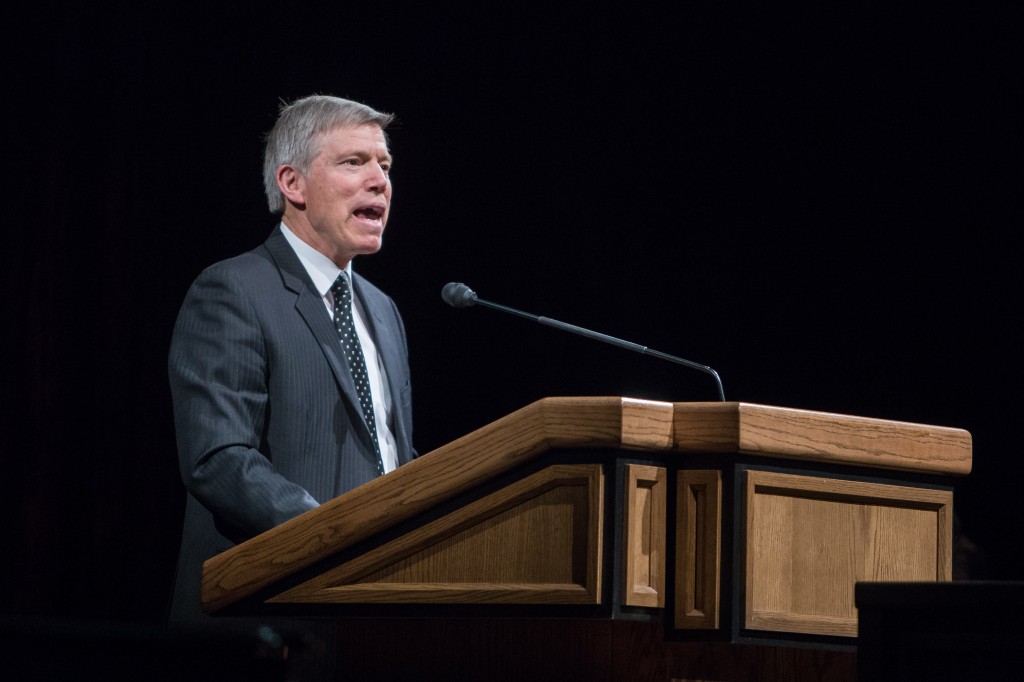
BYU professor of Family Life Jeff Hill spoke to students about the importance of living joyfully within their means at BYU’s Devotional June 9.
Hill has previously worked for IBM and has published more than 70 scholarly articles and book chapters.
He used this experience to teach students the importance of money as well as several suggestions of how to joyfully live within one’s means.
Hill used examples from his own life as an anchor for his talk. He began by explaining how he and his first wife, Juanita, were married while attending BYU. They lived in a small apartment and lived off of food storage.
“We learned that you don’t need a lot of money to be happy,” Hill said.
Hill went onto explain that while people don’t need money to be happy, money does matter and encouraged students to make wise decisions concerning how they use their money.
“We must view (money’s) purpose with an eternal perspective. Money is meant to be a means for serving our families and our God,” Hill said. “When consecrated to those purposes, it is of great worth. … When we focus too much of our time, talents and energy on making money, we sin.”
Hill counseled students that one of the most important criterion for a future spouse was how they handle money.
“Dr. Bernard Poduska reflected, ‘The saying married for better or worse, or until debt do us part’ seems to reflect today’s marital realities more accurately than does the traditional vow,” Hill said.
To help avoid financial problems in life and in marriage, Hill recommended five steps.
First, Hill encouraged students to create, use and update a family budget.
“Everyone, including you, should have a budget,” Hill said. “In marriage relationships, both husband and wife should have a say in budget creation.”
He went onto explain that both the “spender” and the “saver” in a relationship help balance happy financial living and that both should contribute to the budget — the saver by helping the spender stay within the budget, and the spender by suggesting when family vacations and spending money might be appropriate.
He suggested that students turn to personalfinance.byu.edu, lds.org and mint.com to find help in starting a budget.
Second, Hill counseled students to minimize and avoid debt.
He cited Elder Robert D. Hales in saying that debt for education, a modest home and a basic automobile was justifiable. However, he counseled students against common mistakes he’s seen.
“I believe the biggest financial mistake made by recent BYU graduates (is) buying a house that is beyond their means,” Hill said.
He also offered counsel for students already in debt. He told students who are in debt to include a “debt repayment” category in their budget and to actively work to reduce this debt.
Third, Hill suggested that students invest early, consistently and wisely to build a financial reserve.
“If you don’t have much to invest, that’s okay,” Hill said. “You can start as small as a dollar-a-month automatic withdrawal from your checking account through some mutual funds.”
Fourth, Hill counseled not to make stupid decisions with money. He summed this step up by offering some simple counsel.
“When dealing with money, use your common sense; if it sounds too good to be true, it probably is,” Hill said.
He also told students to avoid home equity loans and to make it a policy to never make major purchases on the spot.
“Go home, talk about it with your spouse or someone else you trust, pray about the decision and decide later whether or not to make the purchase,” he said.
He also counseled students not to make decisions when they are feeling hungry, angry, lonely or tired.
Fifth, Hill counseled students to be generous and share their resources with others.
“I invite you to be thoughtful and prayerful as you find ways to be generous and share your resources with others. I promise that you will feel joy as you do so,” Hill said.
He concluded by promising students that they would be able to joyfully live within their means through following these five steps.
“When we understand that money matters and take the time to budget, eliminate debt, invest wisely, make smart decisions and share our resources, we receive both material and spiritual blessings,” Hill said.




